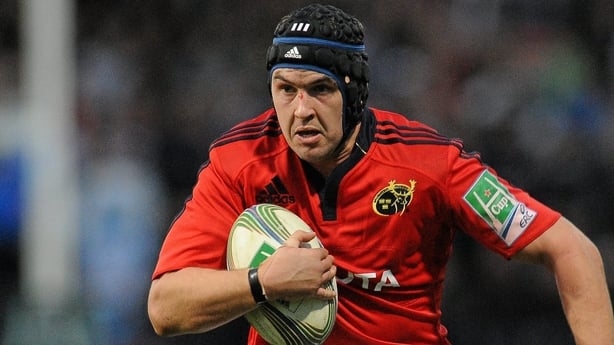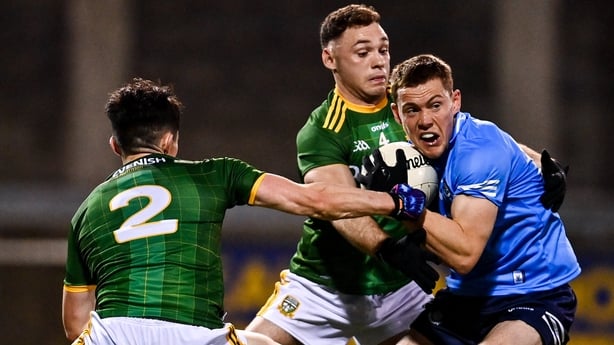When the day came for Niall Ronan to hang up his boots, the former Leinster, Munster and Ireland backrow knew exactly what he wanted to do. Rugby had been his vocation and thanks to a figure from within its ranks, he was well prepared for his post-playing career.
"When I was 24, I had no qualifications whatsoever," he explains. "One day then Munster coach Declan Kidney came up to me. He was basically a teacher to us. He asked what I was doing outside of rugby. I didn't really have a clue.
"I went back to college to do strength and conditioning. I also did all my rugby badges, so when I retired, I said I’d stick to what I know. I went into coaching and set up a gym."
That expertise saw him assume the role of head of strength and conditioning for the Meath Gaelic footballers earlier this year. He will stand on the sideline in Aughrim today and hope his work helps the Royals to a Leinster semi-final.
For Ronan, it was a welcome chance to delve further into his first love.
Growing up, it was a case of rugby one day a week, Gaelic football every day for the St. Colmcille’s clubman. Ronan was a Meath minor and well on his way to an inter-county career when Drogheda’s two rugby clubs amalgamated. The new look outfit reached back-to-back All-Ireland finals and Leinster Youths came calling.
He is quick to acknowledge success in that code would not have been possible if not for his upbringing.
I was not naturally big for one thing. I was a skinny-fat young fella
"I would not have made it as a rugby player if I didn’t play Gaelic football. Not a chance. I was not naturally big for one thing. I was a skinny-fat young fella. I didn’t touch weights until I was 19 or 20.
"But my awareness of space and confidence on the ball, even if I was going to get tackled, I was still confident to take on my man with footwork. Catching high balls was normal to me while for some players it wasn’t. My athleticism helped."
That rearing instilled a profound affection for the sport. Returning to it was a pleasure but it also rekindled deep-seeded frustrations. Playing sport at an amateur level and as a professional ensures a rounded perspective. With the weight of that experience behind him, Ronan points to significant issues within the GAA that need urgent attention.

"Club football needs an education overhaul. What equipment to buy, what should you invest in, having designated people within a club to be S&C coaches from U16s up to seniors. If the GAA were implementing that, it would massively improve the professionalism of the game.
"Unfortunately, you have a mixture of coaches that might not have the knowledge. Some clubs don’t know what to do. Look at clubs in Donegal, Tyrone, Dublin. They have full-time S&C coaches. They are training really professionally at a high level."
Navigating the chaos coronavirus has brought has been a challenge but they have found it manageable. During lockdown, Ronan considered the equipment available to each player and their injury profile before designing a tailored programme. While the results from their Division 1 league campaign were disappointing, there were several positives in the performances.
His real frustration is with the practices that began well before this period and will endure long after.
"Ah man," he exclaims with an exasperated sigh.
"My level one coaching for the GAA. I just did one day of coaching at a course and that is me qualified. Rock up and get it. Whereas when I got my coaching badges with the IRFU, I was interviewed and assessed numerous times. In terms of coaching education, there is no accountability.
It is ad hoc in GAA. With everything. Fixtures are ad hoc. It is all over the place
"On the S&C side of things, you have people doing crazy things. If they had some sort of proper pathway, it would stop all these injuries. The level would improve, and the game would go in the right direction. It is ad hoc in GAA. With everything. Fixtures are ad hoc. It is all over the place."
Alongside Andy McEntee, Ronan has begun streamlining the county’s production line. They have developed a pathway from U15s to senior and focused on upskilling club coaches. The goal is to have everything from the ground up aligned. Every player’s fitness test, strength test and injury profile recorded and monitored. Data that can be tracked and utilised to develop top talent.
A systematic approach enacted from the top down. The way it should be.
"This comes back to my prevailing opinion. Any organisation, in this case the GAA, they should rule the game. They should implement a comprehensive structure, not leave it up to 32 counties.
"There is a fixture nightmare because you are letting people change and set it whenever they want. If a fixture committee could set the games and give security, there would be more buy-in from players and everyone knows what they are doing.
"I own a business. If I let 32 coaches decide on their own thing, it would be a disaster. How can’t people see that? This stuff should be set by the top and implemented below.
"I was head coach of Boyne, my home rugby club, for two years after I retired. The last week of July, we got a fixture list for the first team and second team. They knew every weekend they were off or when they had a game. They can only be cancelled for weather or bereavements. If you do not turn up, you are fined.

"The IRFU are on the GAA’s doorstep. I would be getting advice from them, a professional organisation. How do we do this? How should we structure and organise our season?
"We got to the All-Ireland club final the year I retired. I started training late December and finished in February, over a year later. What sport in the world has a season like that?
"The GPA came out with their proposal for a split year, it makes perfect sense. Why do we need All-Ireland finals in August?
"It really frustrates me. At the start of this year we started planning and we had a nine-week break from the league to the championship. What sport in the world gives you a nine-week break in the middle of the season?"
His first taste of Championship action comes today as Wicklow await. Eleven months of planning and preparation finally put to the test. Yet the reality is there is a bigger picture where things need to change. In Meath, Niall Ronan is determined to help change them.
"It wasn’t my long-term plan to do this and to get back this involved in football but when the Meath job came up, I couldn’t say no. I am from Meath. I am passionate about this and I want to make a difference."
Follow Wicklow v Meath via our live blog on RTÉ.ie/sport and the RTÉ News app, watch live on GAAGO or listen to second half updates on RTÉ Radio 1's Sunday Sport.

